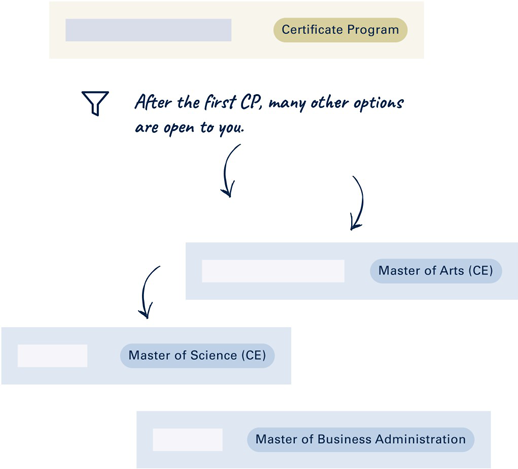-
Graduation
Certificate
-
ECTS-Points
24
-
Learning format
-
Duration
2 semesters, part time
-
Start
Winter semester 2025/26
-
Costs
EUR 4.440,--
-
Admission requirements
According to curriculum
-
Language
English
-
Curriculum
-

On completion of the CP, you will be able to support emergency organisations in dealing with major national and international incidents as an expert in the protection of cultural property.
The "Cultural Property Protection and Disaster Response, CP", is a Stackable Program and can be flexibly combined with other continuing education programs up to the "Cultural Property Protection, MSc (CE)". The staggered modules of the CP offer our students greater flexibility and better integration into their working lives.

Join the international network on cultural property protection and security - the connection to the ESDC makes it possible!
Ass.-Prof. Mag. Dr.
Anna Maria Kaiser
Study Program Director – Center for Cultural Property Protection
Any questions?
We’re here to help.

Ass.-Prof. Mag. Dr.
Anna Maria Kaiser
Study Program Director
Or contact us directly.
Benefit from our study program
- exclusive access for civilians and first responders to the international network of the 'Cultural Property Protection Course' (= Module 1: International Cultural Property Protection), developed specifically for the European Security and Defence College (ESDC)
- Innovative teaching formats challenge your skills with on-site simulation games and exercises
- Leadership and communication in critical situations and under pressure
-
practice-oriented
-
solution-oriented skills
-
leadership skills
More Information
European Security and Defence College (ESDC)
The ESDC is a network of civilian and military institutions that deal with security and defense policy issues in the EU. The "Cultural Property Protection Course" was specifically developed for the ESDC by the Center for Cultural Property Protection.
Cultural Property Protection Exercises
In realistic exercises – ranging from compact simulations to large-scale disaster scenarios – skills are sharpened, protective measures tested, and management strategies put into practice.
Curriculum
The "Cultural Property Protection and Disaster Response, CP" (24 ECTS) can be completed on a part-time basis within 2 semesters.
Duration of the modules: 5-6 days each
Module 1: International Cultural Property Protection
Module 2: International Humanitarian Law
This module is dedicated to International Humanitarian Law, the legal framework for the protection of cultural property, which is firmly embedded in the "Rules of Civilized Warfare". Students will work in small groups under the guidance of experts to develop the core elements and present them in the context of recent case studies.
-
Contents
In addition to the fundamental principles and concepts of the International Humanitarian Law, an understanding of human rights and the legal sources of the International Humanitarian Law provides a solid basis for legal knowledge.
-
Contents
Conventions specific to the protection of cultural property include the 1954 Hague Convention for the Protection of Cultural Property in the Event of Armed Conflict, the Roerich Pact and selected UNESCO Conventions. Actions and initiatives to protect cultural property are discussed through case studies, as are the International Criminal Court in The Hague and the enforcement of international humanitarian law.
Module 3: Leadership and Communication
This module focuses on leadership and communication, enabling students, as future professionals in the field of cultural heritage protection, to take responsibility for their staff and to communicate effectively in stressful situations. Different leadership styles and systems are introduced, and structured training in crisis communication and media relations completes the module.
-
Contents
The topic "Leading in Crisis Situations" focuses on approaches, leadership procedures and leadership principles of emergency organisations to provide, among other things, a basic understanding of staff work, which in turn enables to work together with various emergency response organisations at national and international level to protect cultural property.
-
Contents
A major challenge in any crisis or stressful situation is getting the right information to the right person in the right way, ideally at the right time. In the final structured scenario and media training, presentation techniques are adapted to your own personality.
Module 4: Table-Top Exercise Disaster Response
The CP concludes with a simulation game on crisis management and disaster response with a focus on the protection of cultural heritage. The content of the previous modules is brought together in this simulation game and woven into a complex scenario that has to be mastered - even under time pressure.
-
Contents
Selected working methods of crisis and task forces will be deepened and analysed with regard to time-critical cooperation in order to present them comprehensively in the final simulation game.
-
Contents
The scenario of the simulation game is a (natural) disaster that threatens or has claimed a large number of lives, may destroy the infrastructure of an entire region and will also affect or has affected cultural property. Cultural heritage must also be protected and recovered as part of a large-scale relief operation.
Downloads
Study Program Director
The study program director is Anna Kaiser, Assistant Professor and Head of the Center for Cultural Property Protection. Her research themes predominantly orbit around the protection of cultural property, integrating a multidisciplinary approach that spans ancient history, military studies, and contemporary strategies for safeguarding heritage. Her methodological expertise lies in combining historical analysis with practical military training, emphasizing the application of strategies for protecting cultural heritage in conflict zones and disaster-prone areas.
The lecturers of the CP consist of a large number of renowned international experts from various disciplines with civilian and military backgrounds. They are all involved not only in theoretical and applied research but also in the practice of cultural heritage protection. This ensures that the latest state of research and knowledge is conveyed.
Stackable Program
In combination with other continuing education programs, Stackable Programs can be combined to achieve an academic degree.


The Stackable Program offers me complete flexibility in the design of my studies.
Tatjana Kohl
Student
Application
Admission requirements
- university entrance qualification (or equivalent training at least at NQF level IV) OR at least 2 years of relevant professional experience
- appropriate knownledge of English
- successful completion of an interview with the study program director
Application process
- Contact us: to schedule a personal online interview to clarify your expectations of the continuing education program and check the admission requirements, please complete this form
→ Online Interview with Study Program Director - Online application: Prepare the required documents for uploading in the online tool (UWKonline). Corresponding forms and templates can be found in the "Downloads" section of the "Application" info page.
Click on the button "Go to application" and register via the website of the University for Continuing Education Krems (detailed instructions: "Guide for Online Application").
When selecting the study program in the online tool (see Guide 3.2), choose the study code UM 992 834 under "Study". - For faster administrative processing, please inform us about your successful online application at studium.kgs@donau-uni.ac.at
- After your personal interview and binding online application you will receive an email with payment information.
- Upon receipt of payment, you will receive a final confirmation of your course place via email.
We look forward to receiving your application and to welcoming you soon at the "Cultural Property Protection and Disaster Response, CP".
Follow-up studies & programs
Tags


